情态动词辨析
情态动词

情态动词:1 情态动词按语气强弱,可以分“小强”和“小妹”级别:▲最强的“小强”:Must(语气很强烈,不敢惹)使用频率最多的“小能”:Can(什么都能做)“小能”的胞弟“小酷”:Could(请求别人帮助)“小酷”的好兄弟“小悟”:Would(给别人提供一些东东)还有大家最熟悉的:Should(大家都会用,“应该”)▼最弱的“小妹”: May还有“小妹妹”:Might(语气弱到不行)主语+ Must/ can/ could/ may/ should/need + DO(动词原形)注意情态动词是没有变化形式的,永远都是用原形,也不受主语限制,不管是否三单,都只用原形。
没有cans,musts,shoulds例:We must study hard.He need do some sports.2 主语+情态动词can+…. 2) 主语+情态动词can+ not+…. 2)情态动词can+主语+…?Y es, 主语+情态动词can/No,主语+情态动词can+ notHe can jump. He can not/can’t jump. Can he jump?Y es,he can./ No, he can‘t.3题目4(B) 5 -Can you speak Japanese?-No, I____.A. mustn'tB. can'tC. needn'tD. may not5Y ou are too young.Y ou can(not)ride a bike.1. Can you come here a minute ?请你来一下好吗?情态动词讲解:(1).1)定义及其:情态动词是表示说话人的情绪,态度或语气的动词。
常见的有can , could ;may , might must ; need ,另外,shall , will , should , would在一定的场合也可用作情态动词。
情态动词用法归纳总结
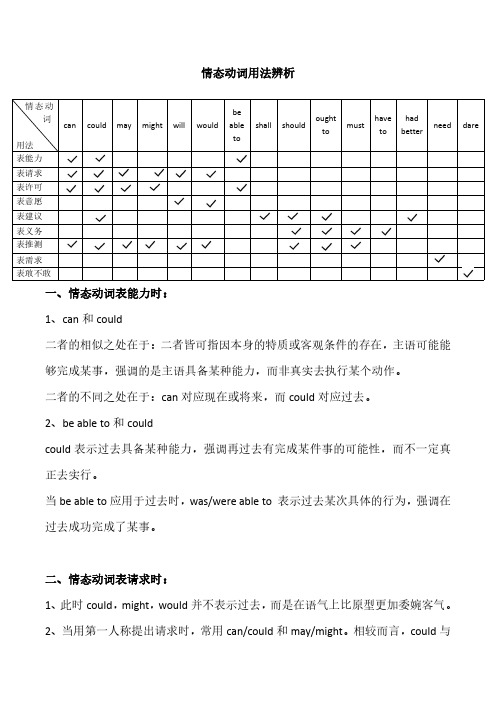
情态动词用法辨析情态动词用法can could may might will would be able to shall should ought to must have to had better need dare表能力表请求表许可表意愿表建议表义务表推测表需求表敢不敢一、情态动词表能力时:1、can 和could二者的相似之处在于:二者皆可指因本身的特质或客观条件的存在,主语可能能够完成某事,强调的是主语具备某种能力,而非真实去执行某个动作。
二者的不同之处在于:can 对应现在或将来,而could 对应过去。
2、be able to 和couldcould 表示过去具备某种能力,强调再过去有完成某件事的可能性,而不一定真正去实行。
当be able to 应用于过去时,was/were able to 表示过去某次具体的行为,强调在过去成功完成了某事。
二、情态动词表请求时:1、此时could ,might ,would 并不表示过去,而是在语气上比原型更加委婉客气。
2、当用第一人称提出请求时,常用can/could 和may/might 。
相较而言,could 与may在表请求的问句中出现的频率最高;might表发请求的语气最为委婉客气,因此反而很少见;而can则常用于熟人间的对话中。
语气强度:can>could/might>might3、当用第二人称提出请求时,常用can/could和will/would。
其中could和would 表达请求的语气更委婉客气;而can与will则常用于熟人对话中。
语气强度:can/will>could/would三、情态动词表许可时:1、与表请求不同,will/would不论前接第几人称,都表示主语本身的意愿,无需得到他人的“许可”,所以will/would不可以用于表请求的句中。
2、can和may二者都可以表示对现在或将来动作的许可,其中can的使用频率更高。
情态动词归纳

情态动词情态动词的用法:常用的情态动词有can,may,must,need,should, had better.1. can 的用法:①表示能力“能,会”eg: He can speak a little Japanese.他会说一点日语。
②表示请求或许可“可以”eg: Can I help you? 要我帮忙吗?③表示猜测“可能”eg: Where can she go now? 她可能到哪里去了呢?2.may 的用法:①表示请求或允许“可以”“准许”eg: May I go home,please?请问我可以回家吗?②表示可能性“可能”、也许”eg: I think it may rain this afternoon. 我想今天下午可能下雨。
注:might为may的过去式,但也可以代替may,语气较为婉转客气或更加不肯定。
eg: ①He might not come today.今天他也许不来了。
(语气不肯定)②You might also get a headache when you work too hard,当你工作太努力时,你也可能患头痛3. must的用法:①表示义务、必要或命令“必须、应该”eg: You must come early tomorrow.你明天得早来。
②表示推测时“肯定,一定”eg: They must be at home.The light is on 他们肯定在家,灯亮着呢.③must not 禁止,不许eg: You must not tell lies. 你不许撒谎。
注意:①must开头的疑问句,其否定回答通常用don't have to 或needn't 。
而不用mustn'teg: ---Must I finish my homework first? 我必须先完成作业吗?---No, you don't have to/ needn't. 不,你不必。
初二英语情态动词的具体用法全面解析

初二英语情态动词的具体用法全面解析【考纲解读】根据对情态动词部分在全国各地中考试题的分析可知,今后该部分将是重点考查点之一。
其考查重点为:1、情态动词在一般疑问句中的问与答2、情态动词表示猜测的用法3、will与shall的用法4、dare与need的用法【知识点梳理】情态动词的具体用法:(一)情态动词概说1.情态动词也是“辅助性”动词,用来表示说话人的语气或情态。
情态动词所表示的情态有:请求、命令、允诺、可能、需要、敢于、愿望、义务、能力等。
2.情态动词本身有词义,但词义不完全,不能单独用作谓语,没有人称和数的变化,且后面只跟动词原形。
如:她会唱英文歌曲。
She cans sing an English song.(F)She can sings an English song.(F)She can sing an English song.(T)3.有些情态动词的过去时与其原形相同,有些与原形不同。
(1) 与原形相同的有:must --- must ought to --- ought to(2) 与原形不同的有:can --- could will --- wouldmay --- might shall --- shouldneed --- needed dare --- dared have to --- had to(二)情态动词的种类:(见下表)(三)情态动词的否定形式:cannot --- can’t could not --- couldn’t may not--- mayn’tmight not--- mightn’t must not --- mustn’t will not --- won’twould not --- wouldn’t need not --- needn’t shall not --- shan’tshould not --- shouldn’t ought not --- oughtn’t dare not --- daren’t(四)常用情态动词的用法:1.can与could1). can(1)表示体力或脑力方面的“能力”,也能表示根据客观条件能做某事的“能力”。
高考英语二轮复习情态动词和虚拟语气考点讲解含解析
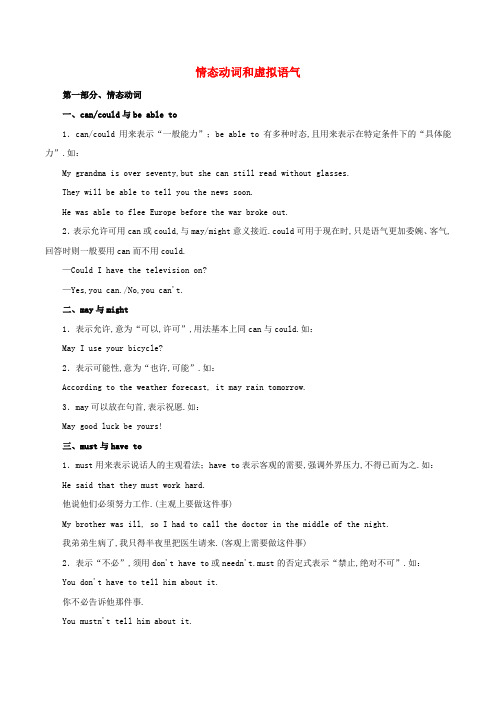
情态动词和虚拟语气第一部分、情态动词一、can/could与be able to1.can/could用来表示“一般能力”;be able to有多种时态,且用来表示在特定条件下的“具体能力”.如:My grandma is over seventy,but she can still read without glasses.They will be able to tell you the news soon.He was able to flee Europe before the war broke out.2.表示允许可用can或could,与may/might意义接近.could可用于现在时,只是语气更加委婉、客气,回答时则一般要用can而不用could.—Could I have the television on?—Yes,you can./No,you can't.二、may与might1.表示允许,意为“可以,许可”,用法基本上同can与could.如:May I use your bicycle?2.表示可能性,意为“也许,可能”.如:According to the weather forecast, it may rain tomorrow.3.may可以放在句首,表示祝愿.如:May good luck be yours!三、must与have to1.must用来表示说话人的主观看法;have to表示客观的需要,强调外界压力,不得已而为之.如:He said that they must work hard.他说他们必须努力工作.(主观上要做这件事)My brother was ill, so I had to call the doctor in the middle of the night.我弟弟生病了,我只得半夜里把医生请来.(客观上需要做这件事)2.表示“不必”,须用don't have to或needn't.must的否定式表示“禁止,绝对不可”.如:You don't have to tell him about it.你不必告诉他那件事.You mustn't tell him about it.你绝不能告诉他那件事.—Must we do it now?我们必须现在做吗?—No, you needn't.不,你们不必.四、shall1.用于第一、第三人称的疑问句中,用来征求对方的意见或请求指示.如:What shall he do next?他下一步干什么呢?2.用于第二、第三人称的陈述句中,表示说话人的意愿,有“命令、警告、允诺、威胁、强制”等意思.如:He shall stay in bed.他必须躺在床上.You shall have it back next week.下周一定还你.He says he won't go, but I say he shall.他说他不去,但我说他必须去.五、will与would1.will用于各种人称,表示“意志、意愿”或“决心”等.如:If you will keep your watch half an hour slow, it is hardly surprising that you are late for your appointments.如果你想要让你的表慢半个小时,你约会时迟到就不足为怪了.2.will表示习惯性的动作,有“总是,惯于”的含义.如:An Englishman will usually show you the way in the street.英国人通常是会在街上给你指路的.3.would可表示过去反复发生的动作.如:On Sundays he would get up early and go fishing.星期天他总是早起去钓鱼.六、should与ought to1.should表示“建议”或“劝告”,有“应该”之意.如:You should learn from each other.2.ought to表示根据某种义务或必要“应当”做某事.如:Everyone ought to obey the traffic regulations.3.should和ought to也可用来表示推测,意为“想必会……”.如:—When can I come for the photos? I need them tomorrow afternoon.—They should be ready by 1200.七、情态动词表示推测1.can用于肯定句中表示客观的可能性,意为“有时会”;用于疑问句中可以表示推测,意为“可能”,有时表示一种惊讶的语气;用于否定句中也可以表示推测,can't意为“不可能”,语气很强烈.It is usually warm in my hometown in March, but it can be rather cold sometimes.我的家乡在三月份通常很暖和,但有时候也会相当冷.Mr. Bush is on time for everything. How can it be that he was late for the meeting?布什先生做什么事情都很准时,他怎么可能开会迟到呢?—Let's visit Tom together, Stephen.—There's no need to do so. He can't be at home, because I saw him board the flight to Beijing this morning.——Stephen,咱们一起拜访汤姆吧.——没必要这样做.他一定不在家,因为今天早晨我看见他登上了飞往北京的航班.2.may/might用于肯定句中可以用来表示不十分肯定的推测,意为“有可能”;用于否定句中也可以表示推测,may not意为“可能不”,表示一种不太确定的语气.The traffic is heavy these days. I might arrive a bit late, so could you save me a place?这些天交通很繁忙,我可能会来晚一点,请你帮我保留个位置好吗?3.must表示推测时只能用于肯定句中,意为“一定,必定”,表示十分肯定的语气(在疑问句中或否定句中要用can/could).—It's the office! So you must know eating is not allowed here.—Oh, sorry.——这是办公室!所以你一定知道这里不许吃东西.——噢,对不起.4.should用来表示推测时意为“应该”,即含有“按道理来说应当如此”的意思.There shouldn't be any difficulty about passing the road test since you have practiced a lotin the driving school.因为你在驾校训练了这么多,通过路考应该没什么困难.八、“情态动词+have done”结构1.should/ought to+have done,表示“过去本应该做而(实际)没有做的事情”,含有责备或遗憾的语气,意为“本应该……”.其否定形式为“should not/ought not to have+done”,表示某种行为本不该发生但实际上发生了.I shouldn't have watched that movie—it'll give me horrible dreams.我本不应该看那部电影——它会令我做噩梦.You ought to have come to the party yesterday, but why didn't you come?昨天你本来应该参加聚会的,可是你为什么不来?2.must+have done,用于肯定句,表示“过去一定做过某事”,表示一种很有把握的推测.注意,对过去发生的情况的否定推测常用“can't/couldn't+have done”表示.—Ye Shiwen won two gold medals in London Olympic Games.—She must have gone through tough training.——叶诗文在伦敦奥运会获得了两枚金牌.——她肯定受到严格的训练.—Do you know where David is? I couldn't find him anywhere.—Well. He can't have gone far—his coat's still here.——你知道大卫在哪里吗?我到处找不到他.——大卫的上衣还在这里,因此他肯定没走远.3.needn't+have done,表示“过去没有必要做某事,但实际上做了某事”.Mark needn't have hurried. After driving at top speed, he arrived half an hour early.马克本没必要那么匆忙.他以最快速度开车,结果早到了半个小时.4.may/might+have done,表示对过去情况的一种不太有把握的可能性的推测,表示“可能已做了某事……”,否定句表示“可能还没有……”.Sorry, I'm late. I might have turned off the alarm clock and gone back to sleep again.对不起,我迟到了.我可能把闹钟关掉后又睡着了.5.could+have done表示“过去本来可以做某事,但实际上没有做”;can/could+have done表示“过去可能做了某件事”.I could have saved the poor rabbit, but I didn't have the right drugs with me at that moment.我本来可以拯救那只可怜的兔子的,可是我当时没有合适的药品.第二部分、虚拟语气一、虚拟语气在虚拟条件句中的用法1.在具体运用中,条件从句中有时可省略if而采用倒装结构.如:Had it not been for your help, we wouldn't have achieved so much.2.介词without/but for、连词but、副词otherwise常用来表示某种假设条件.如:I wouldn't have made such rapid progress without your help.3.有时候从句动作和主句动作发生的时间不一致,这时谓语动词的形式要根据各自的时间来调整.如:If the weather had been more favourable, the crops would be growing still better.二、“should+动词原形”表示的虚拟语气这一类型常见词有“一坚持(insist)、二命令(order, command)、三建议(advise, suggest, propose)、四要求(request, require, demand, desire)”.以上词及其派生名词所接的名词性从句都使用“(should +)动词原形”的虚拟语气.①Jane's pale face suggested that she was ill, and her mother suggested that she(should) havea medical examination.简苍白的脸色表明她病了,她母亲建议她去检查身体.②She insisted that the man had stolen her car and that he(should) be sent to prison.她坚持说那个男人偷了她的车,并坚决要求他坐牢.三、特殊句式中的虚拟语气If only/It's (high) time (that)...wish/would rather/as if等固定句式要求用相应的虚拟语气表达形式.①I wish I could fly.真希望我能飞.②I would rather you came tomorrow.我宁愿你明天来.③If only I had taken your advice!要是听从了你的建议该多好啊!高频考点一、考查情态动词例1.(2018·北京卷)In today’s information age, the loss of data _________ cause serious problems for a company.A. needB. shouldC. canD. must【答案】C【解析】考查情态动词.句意:在今天的信息时代,数据的丢失有时会对一个公司造成严重的问题.数据丢失造成严重问题是客观上会发生的情况,即“客观可能性”,故该空应用情态动词can.C选项正确.其余情态动词均没有该用法.need需要;should应该,竟然;must必须,肯定.【变式探究】—Can’t you stay a little longer?—It’s getting late. I reall y _____go now, My daughter is home alone.A .mayB .canC . mustD .dare【答案】C【解析】句意:——你不能再多待会儿吗?——很晚了,我必须得走了.我女儿一个人在家.A. may可能,可以,也许;B. can能,会;C. must必须,必然要,必定会;D. dare敢,胆敢.结合句意,故选C.【变式探究】________ I have a word with you? It won’t take long.A. CanB. MustC. ShallD. Should【答案】A【解析】本题考察的是情态动词基本意义辨析.Can能够,可能;must必须,一定;非得;shall将要;should应该;句意:我可以和你谈谈吗?不会花很多时间的.根据句意可知本题使用can I…?表示询问对方是否允许.如:Can I use your dictionary?我可以使用你的字典吗?故A正确.高频考点二、考查情态动词的用法例2. (2018·天津卷) I can't find my purse. I___________ it in the supermarket yesterday, but I'm not sure.A. should leaveB. must have leftC. might leaveD. could have left【答案】D【解析】考查情态动词表推测.句意:我不能找到我的钱包了,昨天我有可能把它落到超市了,但我不确定.根据句中时间状语yesterday可知,是对过去事情的推测,故用情态动词+ have done,再根据后句but I’m not sure.可知,此推测为不能肯定的推测,故用情态动词could,表示“可能”.故选D.【变式探究】(2017•天津)My room is a mess, but I __________clean it before I go out tonight.I can do it in the morning.A. daren’tB. shouldn’tC. needn’tD. mustn’t【答案】C【解析】句意:我的房间很乱,但是在今晚我出去之前不需要打扫,我可以明天早晨再打扫.A.不敢;B.不应该;C不需要;D.不许.根据句意,故选C.【变式探究】Why didn't you tell me about your trouble last week?If you ________(tell)me,I could have helped.【答案】had told【解析】句意:上个星期你为什么不告诉我你的麻烦事?如果你告诉我了,我就能帮你.根据句意和相关信息判断,条件句表示与过去事实相反的假设,此时从句用过去完成时,主句谓语用“情态动词+have done”形式.【变式探究】I ______ have worried before I came to the new school, for my classmates here are very friendly to me.A. mightn’tB. mustn’tC. needn’tD. couldn’t【答案】C【解析】句意:我来新学校之前本没有必要担心,因为在这里我的同学对我非常友好.needn’t have done本没有必要做某事,表示实际上已经做了某事.根据句意可知选C.高频考点三、考查虚拟语气例3.(2019·天津卷)The workers were not better organized, otherwise they ________ the task in half the time.A.accomplished B.had accomplishedC.would accomplish D.would have accomplished【答案】D【解析】考查虚拟语气.句意:工人们没有被组织好,否则的话他们会用那一半的时间完成任务的.此处otherwise表达了一种含蓄虚拟;otherwise前的内容所述的是过去的事实,相当于if引导的条件状语从句“If the workers had been better organized”,因此后半部分应用“主语+would have done sth.”的结构.故选D.【举一反三】【2018·江苏】It’s strange that he _______have taken the books without the owner’s permission.A. wouldB. shouldC. couldD. might【答案】B【解析】考查虚拟语气.句意:真奇怪,他竟然没有主人的允许就拿走了这些书.在句型”It is important/necessary/strange/impossible/natural that...”中,其中由that引导的主语从句通常用“should+动词原形”这样的虚拟语气,其中的should可以省略.故选B.【变式探究】(2017·北京)If the new safety system _______ to use, the accident would never have happened.A. had been putB. were putC. should be putD. would be put【答案】A【解析】句意:如果这个新的安全系统被投入使用过的话,这个事故就不会发生了.根据主句确定是对过去情况的虚拟,所以从句谓语用had done形式,此外根据句意可知是被动,用被动语态,故A项是正确的.【变式探究】________(have)the governments and scientists not worked together,AIDSrelated deaths would not have fallen since their highest in 2005.【答案】Had【解析】句意:如果政府和科学家不共同努力,与艾滋病相关的死亡就不会从2005年的最高点下降.这是一个省略了从属连词if的虚拟语气句,使用了倒装句式.根据主句的would not have fallen可知,这里是表示过去的虚拟语气,所以用had.【变式探究】Without his wartime experiences, Hemingway____ his famous novel A Farewell to Arms.A.didn’t writeB. hadn’t writtenC. wouldn’t w riteD. wouldn’t have written【答案】D【解析】句意:没有他战时的经验,海明威就不可能写出著名的小说永别了武器.根据without his wartime experience没有战时的经历,可知表示对于过去的否定猜测,故主句用would have done,因此选D 项.1.(2019·天津卷)The workers were not better organized, otherwise they ________ the task in half the time.A.accomplished B.had accomplishedC.would accomplish D.would have accomplished【答案】D【解析】考查虚拟语气.句意:工人们没有被组织好,否则的话他们会用那一半的时间完成任务的.此处otherwise表达了一种含蓄虚拟;otherwise前的内容所述的是过去的事实,相当于if引导的条件状语从句“If the workers had been better organized”,因此后半部分应用“主语+would have done sth.”的结构.故选D.2.(2019·江苏卷)What a pity! You missed the sightseeing, or we ________ a good time together.A.had B.will haveC.would have had D.had had【答案】C【解析】考查虚拟语气.句意:多么遗憾!你错过了这次游览.否则,我们就可以一起度过一段愉快的时光.根据关键词or可知,这里表示与过去的事实相反,谓语动词应用would/could/should/might+have done.1.【2018·江苏】 There is a good social life in the village, and I wish I _______ a second chance to become more involved.A. hadB. will haveC. would have hadD. have had【答案】A【解析】考查虚拟语气.句意:在这个村里有很好的社交生活,并且我希望我再有机会去更多的参与.本题考查wish引导的宾语从句,表示与现在事实相反的愿望,所以从句用一般过去时.故选A.2.【2018·江苏】It’s strange that he _______have taken the books without the owner’s permission.A. wouldB. shouldC. couldD. might【答案】B【解析】考查虚拟语气.句意:真奇怪,他竟然没有主人的允许就拿走了这些书.在句型”It isimport ant/necessary/strange/impossible/natural that...”中,其中由that引导的主语从句通常用“should+动词原形”这样的虚拟语气,其中的should可以省略.故选B.3.(2018·天津卷) I can't find my purse. I___________ it in the supermarket yesterday, but I'm not sure.A. should leaveB. must have leftC. might leaveD. could have left【答案】D【解析】考查情态动词表推测.句意:我不能找到我的钱包了,昨天我有可能把它落到超市了,但我不确定.根据句中时间状语yesterday可知,是对过去事情的推测,故用情态动词+ have done,再根据后句but I’m not sure.可知,此推测为不能肯定的推测,故用情态动词could,表示“可能”.故选D.4.(2018·北京卷)In today’s information age, the loss of data _________ cause serious problems for a company.A. needB. shouldC. canD. must【答案】C【解析】考查情态动词.句意:在今天的信息时代,数据的丢失有时会对一个公司造成严重的问题.数据丢失造成严重问题是客观上会发生的情况,即“客观可能性”,故该空应用情态动词can.C选项正确.其余情态动词均没有该用法.need需要;should应该,竟然;must必须,肯定.5.(2018·北京卷)They might have found a better hotel if they _________ a few more kilometers.A. droveB. would driveC. were to driveD. had driven【答案】D【解析】考查虚拟语气.句意:如果他们多开几公里的话,他们也许会找到一个更好的旅馆.由“they might have found a better hotel”可知,该句是表示对过去的虚拟.if ____ a few more kilometers是条件句部分,表示对过去的虚拟,条件句部分要用过去完成时态,故D选项正确.1.(2017·北京)Samuel, the tallest boy in our class, ______ easily reach the books on the top shelf.A. mustB. shouldC. canD. need【答案】C【解析】A. must 必须 B. should 应该 C. can 能 D. need 需要.句意:Samuel,我班最高的男生,能很轻松地够着书架顶上的书,此处需要一个表示能力的词,故用can,答案为C.2.(2017•天津)My room is a mess, but I __________clean it before I go out tonight. I can do it in the morning.A. daren’tB. shouldn’tC. needn’tD. mustn’t【答案】C【解析】句意:我的房间很乱,但是在今晚我出去之前不需要打扫,我可以明天早晨再打扫.A.不敢;B.不应该;C不需要;D.不许.根据句意,故选C.3.(2017•江苏) _______ not for the support of the teachers, the student could not overcome her difficulty.A. It wereB. Were itC. It wasD. Was it【答案】B【解析】考查虚拟语气和倒装.虚拟语气中,be动词统一用were;虚拟语气的省略形式主要是把if省略,同时把were/should/had提前,即Were /Should/ Had I...,故选B.句意:要不是老师们的支持,该生是无法克服她自己的困难的.4.(2017·江苏卷) ____________ not for the support of the teachers, the student could not overcome her difficulty.A. It wereB. Were itC. It wasD. Was it【答案】B【解析】考查虚拟语气的省略.虚拟语气中,be动词统一用were;虚拟语气的省略形式主要是把if省略,同时把were/should/had提前,即Were /Should/ Had I...,故选B.5.(2017•江苏) _______ not for the support of the teachers, the student could not overcomeher difficulty.A. It wereB. Were itC. It wasD. Was it【答案】B【解析】考查虚拟语气和倒装.虚拟语气中,be动词统一用were;虚拟语气的省略形式主要是把if省略,同时把were/should/had提前,即Were /Should/ Had I...,故选B.句意:要不是老师们的支持,该生是无法克服她自己的困难的.6.(2017·北京)If the new safety system _______ to use, the accident would never have happened.A. had been putB. were putC. should be putD. would be put【答案】A【解析】句意:如果这个新的安全系统被投入使用过的话,这个事故就不会发生了.根据主句确定是对过去情况的虚拟,所以从句谓语用had done形式,此外根据句意可知是被动,用被动语态,故A项是正确的.1.(2016·浙江,15)________(have)the governments and scientists not worked together,AIDSrelated deaths would not have fallen since their highest in 2005.【答案】Had【解析】句意:如果政府和科学家不共同努力,与艾滋病相关的死亡就不会从2005年的最高点下降.这是一个省略了从属连词if的虚拟语气句,使用了倒装句式.根据主句的would not have fallen可知,这里是表示过去的虚拟语气,所以用had.2.(2016·浙江,17)George can't ________(go)too far.His coffee is still warm.【答案】have gone【解析】句意:乔治不可能走得太远了.他的咖啡仍然是温的.can't have done是对过去的否定推测.3.(2016·北京,34)Why didn't you tell me about your trouble last week?If you ________(tell)me,I could have helped.【答案】had told【解析】句意:上个星期你为什么不告诉我你的麻烦事?如果你告诉我了,我就能帮你.根据句意和相关信息判断,条件句表示与过去事实相反的假设,此时从句用过去完成时,主句谓语用“情态动词+have done”形式.。
常见情态动词的用法
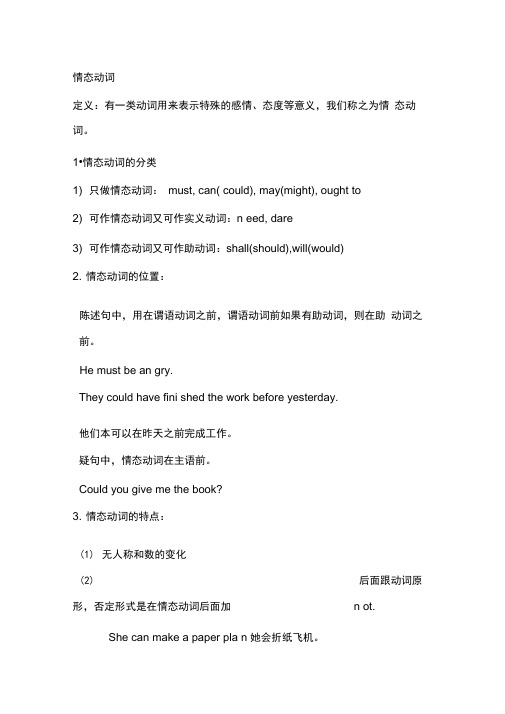
情态动词定义:有一类动词用来表示特殊的感情、态度等意义,我们称之为情态动词。
1•情态动词的分类1) 只做情态动词:must, can( could), may(might), ought to2) 可作情态动词又可作实义动词:n eed, dare3) 可作情态动词又可作助动词:shall(should),will(would)2. 情态动词的位置:陈述句中,用在谓语动词之前,谓语动词前如果有助动词,则在助动词之前。
He must be an gry.They could have fini shed the work before yesterday.他们本可以在昨天之前完成工作。
疑句中,情态动词在主语前。
Could you give me the book?3. 情态动词的特点:(1)无人称和数的变化(2)后面跟动词原形,否定形式是在情态动词后面加n ot.She can make a paper pla n 她会折纸飞机。
He may not come today.(3)个别情态动词(can, may, shall, will)有现在式和过去式两种形式,过去式用来表达更加客气,委婉的语气。
(4)情态动词属于不及物动词,没有被动语态。
(5)情态动词表达的是一种想法(能,可以,敢)。
情态动词+行为动词原形情态动词主要有:can(could)能够,may(might)可以,must 必须,need需要,ought to 应该,dare(dared敢,shall(should)应该,will(would)将要,have to不得不,had better最好4•常见情态动词的用法辨析(1) can/could 的用法①表示能力:能,能够,会—Can you swim?—No, I can ' t.②表示可能性a. 表示客观上的可能性,用在肯定句中,could比can的可能性要弱一些Most accide nt in the home could be preve nted.大多数家庭事故是可以避免的。
初中英语语法情态动词用法辨析归纳2

初中英语语法:情态动词用法辨析归纳2could have done用法解析英语中 could have done 是一种常见的固定句式,表示“未曾实现的……”,下面将详细介绍下could have done的用法。
一、could have done 表示未曾实现的选择could have done 表示过去本来可以有机会选择做某事,但实际上没有那样做,通常译为“本来可以”。
如:You needn't have typed it twice. You could have used a carbon.你没必要打两遍的,你当时本可以用复写纸打。
You needn't have walked up; you could have taken the lif 你没必要走着上去,你本来可以乘电梯的。
I could have lent you the money. Why didn't you ask me? 我本来可以借这笔钱给你的。
你为什么不向我提出?You needn’t have cooked it. We could have eaten it raw 你其实可以不煮熟(它),我们(本来)可以生吃。
二、could have done 表示未曾实现的想法could have done 表示过去本来有做某事的打算或意图,但实际上没有实现,通常译为“本来可以”。
如:I could have lent you the money. Why didn't you ask me?我本来可以借这笔钱给你的。
你为什么不向我提出?I could have given you some hints, but I suppose you thought yourself too grand.我本可以给你点提示的,但是我认为你太自负了。
三、could have done 表示未实现的可能性could have done 表示过去本来可能发生情况,而实际上没有发生,通常译为“本来可以”“本来可能”等。
【中考英语 考题研究】专题09 情态动词(解析版)

专题09 情态动词1.(2022·江苏淮安·统考中考真题)—Miss Li. I don’t want to say sorry to Daniel.—I’m afraid you ________. After all, you broke his glasses.A.may B.have to C.mustn’t D.needn’t【答案】B【详解】句意:——李小姐。
我不想向丹尼尔道歉。
——恐怕你必须这么做。
毕竟,你打破碎了他的眼镜。
考查情态动词。
may可能;have to必须;mustn’t禁止;needn’t不需要。
根据“After all, you broke his glasses.”可知对方必须要向丹尼尔道歉,故选B。
2.(2022·江苏盐城·统考中考真题)Safety comes first. Everyone on the coach ________ wear the seat belt.A.can B.can’t C.must D.mustn`t【答案】C【详解】句意:安全第一。
车上的每个人都必须系好安全带。
考查情态动词。
can能,可以;can’t不能,不会;must必须;mustn’t禁止,不能。
根据“Safety comes first”和“wear the seat belt”可知,安全最重要,故必须系好安全带。
故选C。
3.(2022·江苏南通·统考中考真题)In the library you ________ draw or write in the books, or you will be fined.A.mustn’t B.needn’t C.wouldn’t D.couldn’t【答案】A【详解】句意:在图书馆你不能在书上画画或写字,否则你会被罚款。
考查动词辨析。
mustn’t禁止;needn’t不必;wouldn’t不会;couldn’t不可能。
人教版七年级下册英语之情态动词的常见错误
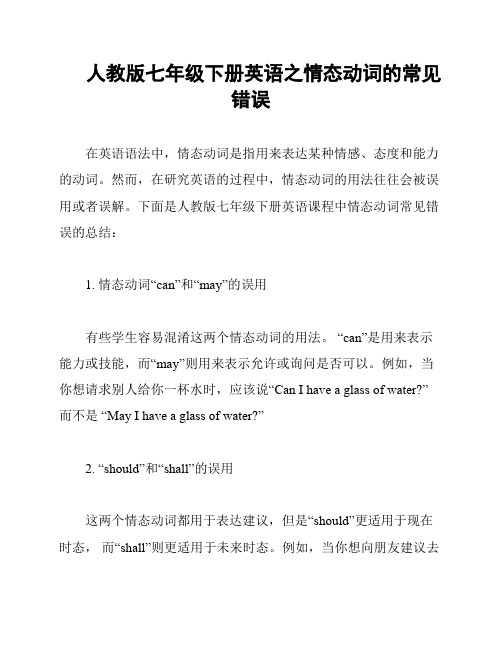
人教版七年级下册英语之情态动词的常见
错误
在英语语法中,情态动词是指用来表达某种情感、态度和能力的动词。
然而,在研究英语的过程中,情态动词的用法往往会被误用或者误解。
下面是人教版七年级下册英语课程中情态动词常见错误的总结:
1. 情态动词“can”和“may”的误用
有些学生容易混淆这两个情态动词的用法。
“can”是用来表示能力或技能,而“may”则用来表示允许或询问是否可以。
例如,当你想请求别人给你一杯水时,应该说“Can I have a glass of water?” 而不是“May I have a glass of water?”
2. “should”和“shall”的误用
这两个情态动词都用于表达建议,但是“should”更适用于现在时态,而“shall”则更适用于未来时态。
例如,当你想向朋友建议去
看一场电影时,应该说“we should go to see a movie”而不是“we shall go to see a movie”
3.动词用法问题
有些情态动词有一些固定的动词短语。
例如,“had better”和“would rather” 通常会后接以“not”开头的动词。
例如,我们应该说“had better not go ”而不是“had better don't go”
以上是人教版七年级下册英语课程中情态动词常见的误用,希望同学们可以注意这些错误,提高自己的英语语法水平。
情态动词辨析

情态动词辨析:
1、should/ought to 用法
1)表示道义上的责任、义务或要求,有时也表示劝告。
2)表示推测或可能性,意为“按理说应该”。
肯定的语气没有must 强。
3)表示说话人的一种谦逊、客气、委婉的语气,常用于第一人称。
2、need 用法
1)作情态动词时,表“需要”或“必须”,仅用于否定句或疑问句。
2)作实义动词时有时态、人称和数的变化。
3、will/would 用法
1)表意愿、决心等。
2)表经常性、习惯性、倾向性。
3)表功能、性质。
4)表估计,意为“想必,大概”。
5)表“请求、要求”,用于疑问句,常与you 连用,即Will you?
4、shall 用法
1)表征求意见,意为“好不好”,用于第一、三人称。
2)表允诺、威胁、警告、命令或按规定有义务做,用于第二、三人称。
3)表规章、法令、预言,意为“必须”,用于所有人称。
情态动词的概念
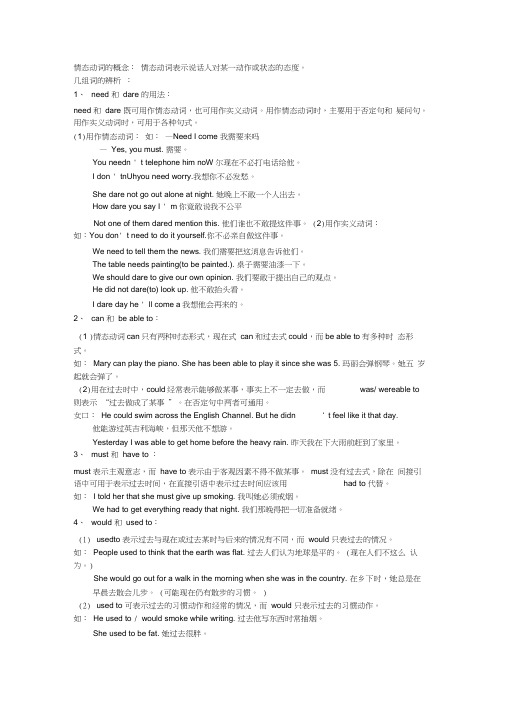
情态动词的概念:情态动词表示说话人对某一动作或状态的态度。
几组词的辨析:1、need 和dare 的用法:need 和dare 既可用作情态动词,也可用作实义动词。
用作情态动词时,主要用于否定句和疑问句。
用作实义动词时,可用于各种句式。
(1)用作情态动词:如:—Need I come 我需要来吗—Yes, you must. 需要。
You needn ' t telephone him noW尔现在不必打电话给他。
I don ' tnUhyou need worry.我想你不必发愁。
She dare not go out alone at night. 她晚上不敢一个人出去。
How dare you say I ' m你竟敢说我不公平Not one of them dared mention this. 他们谁也不敢提这件事。
(2)用作实义动词:如:You don' t need to do it yourself.你不必亲自做这件事。
We need to tell them the news. 我们需要把这消息告诉他们。
The table needs painting(to be painted.). 桌子需要油漆一下。
We should dare to give our own opinion. 我们要敢于提出自己的观点。
He did not dare(to) look up. 他不敢抬头看。
I dare day he ' ll come a我想他会再来的。
2、can 和be able to:(1 )情态动词can只有两种时态形式,现在式can和过去式could,而be able to有多种时态形式。
如:Mary can play the piano. She has been able to play it since she was 5. 玛丽会弹钢琴。
英语情态动词的基本用法

英语情态动词的基本用法英语情态动词的基本用法情态动词的使用一般是英语学习中的重点,以下是小编整理的英语情态动词的基本用法,欢迎参考阅读!一、情态动词的基本用法1. can基本含义与用法(1)(表示能力)能……;会……,(2)(表示可能、许可)能够……;可以,(3)(表温和的命令)请做……;得……,(4)(用于疑问句中,表请求、提议)能不能……;要不要…,(5)(用于疑问句中,表惊讶、怀疑等)“(到底)可能有这样的事吗?”,(6)构成特殊句式:①cannot/ can never...too...或cannot...enough “无论怎么……也不过分;越……越好;非常……”。
One cannot be too careful. 越认真越好。
I cannot thank you enough.我对你感激不尽。
②cannot help doing.../ cannot help but do.../ cannnot but do...“禁不住;不由得;不得不”。
【注意】情态动词完成式的用法:表示已经发生的情况,can’t/ couldn’t have +过去分词,表示对已发生情况的否定推测,译为“(昨天)一定没……”。
例如:Mary couldn’t have received my letter; otherwise she would have replied before now.表示虚拟语气,could have+过去分词,表示过去本来可以做但却未做,译为“完全可以……”。
例如: What you said is right, but you could have phrased it more tactfully.2. may基本含义与用法(1)(表准许、请求)可以、(2)(表愿望、祝福)但愿;祝……。
此时,句子要用倒装语序、(3)(用于目的状语从句中)为了;为了能够、(4)(用于让步状语从句中)即使;无论、(5)构成句型:may/ might as well do sth. “还是做某事的好;不妨去做某事”【注意】情态动词完成式的用法:表示已经发生的情况,may/ might have +过去分词,表示对已发生的事情做不肯定、可能性很小的推测,或事实上根本没发生,译为“也许……”。
高中英语语法系统讲解之八情态动词和虚拟语气

高中英语语法系统讲解之八情态动词和虚拟语气情态动词一. 情态动词的类型和特征1. 类型○1只作情态动词用的有:can(could),may(might),must,ought to。
○2可作情态动词也作实义动词的有:need,dare。
○3可作情态动词也作助动词的有:shall(should),will(would)。
○4具有情态动词某些特征的有:have(had)to,used to。
2. 特征情态动词有一定的词义,但不能单独作谓语,须和实义动词或系动词连用,构成谓语;且适用于主语的各种人称和数(have to例外),主语是第三人称单数时,要用has to。
二. 情态动词的基本用法1. can与could○1表示能力或客观可能性,还可表示请求和允许,她存在以下几种形式:如Children can be troublesome sometimes.○2表示惊异、推测、怀疑、不相信的态度(主要用于否定句、疑问句中)。
如This can’t be done by him.○3 can的习惯用法A. can but的用法can but“只好,至多不过”,如We can but do our best.B. cannot help but,cannot help的用法二者都表示“不得不;不能避免;不禁”;但前者后加动词原形,后者加代词或动名词等。
如The girl couldn’t help but live on herself.When I try to speak, I can’t help making mistakes.C. cannot … too“无论怎样……都不过分;越……越好”如We can’t thank you too much for what you have done for us。
We can not be too careful to cross the road.温馨提示:○1 can与be able to:can表示有能力做某事,be able to表示通过努力、克服困难做成某事。
高中英语语法七[1].虚拟语气、情态动词
![高中英语语法七[1].虚拟语气、情态动词](https://img.taocdn.com/s3/m/bc23378a960590c69ec37643.png)
一、用“情态动词+have +done”结构表示 对过去动作的推测,高考试题中常用过去时 态或过去的时间状语给以暗示。情态动词的 这一用法可以用 “对立统一”来概括。
1.当试题的前句和后句在动作和意义上相互 补充说明,且整个句意在动作和时间上是一 个整体时,我们可用“统一”关系来解决这 样的试题。常见的结构有:
由题意和下句中的 “I’m not sure” 可知这段对话中存在一种 可能性推测,might可以用来表 示一种比较委婉的可能性判断, 故本题选D。
5)I should have been there, but I ____ _ not find the time. (上海2000春) A. would B. could C. might D. should
C. shouldn’t; must D. can’t; shouldn’t
mustn’t 表示“不可以;禁止”, 分析题意可知第二个空表示某种 可能性,故本题选B。
7) —Will you stay for lunch﹖ —Sorry, ______. My brother is coming to see me. (NMET’99) A. I mustn’t B. I can’t C. I needn’t D. I won’t
2) —I hear you’ve got a set of valuable Australian coins. ______ I have a look﹖ —Yes, certainly. (北京2005春) A. Do B. May C. Shall D. Should
分析语境可知这是在征求对方的许 可,may表示“允许、可以”,语
C. could have studied D. studied
初中英语情态动词讲解-练习及答案
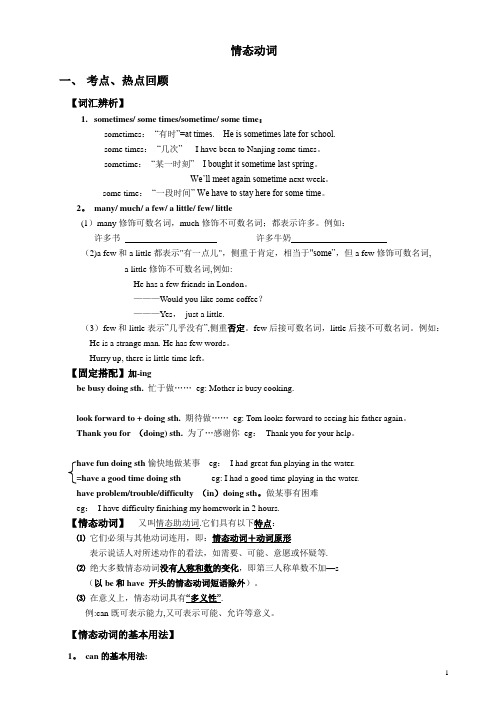
情态动词一、考点、热点回顾【词汇辨析】1.sometimes/ some times/sometime/ some time:sometimes:“有时”=at times. He is sometimes late for school.some times:“几次” I have been to Nanjing some times。
sometime:“某一时刻” I bought it sometime last spring。
We’ll meet again sometime next week。
some time:“一段时间” We have to stay here for some time。
2。
many/ much/ a few/ a little/ few/ little(1)many修饰可数名词,much修饰不可数名词;都表示许多。
例如:许多书许多牛奶(2)a few和a little都表示"有一点儿",侧重于肯定,相当于"some”,但a few修饰可数名词,a little修饰不可数名词,例如:He has a few friends in London。
———Would you like some coffee?———Yes,just a little.(3)few和little表示”几乎没有”,侧重否定。
few后接可数名词,little后接不可数名词。
例如:He is a strange man. He has few words。
Hurry up, there is little time left。
【固定搭配】加-ingbe busy doing sth.忙于做……eg: Mother is busy cooking.look forward to + doing sth. 期待做……eg: Tom looks forward to seeing his father again。
情态动词考点解析(Word版附答案)经典
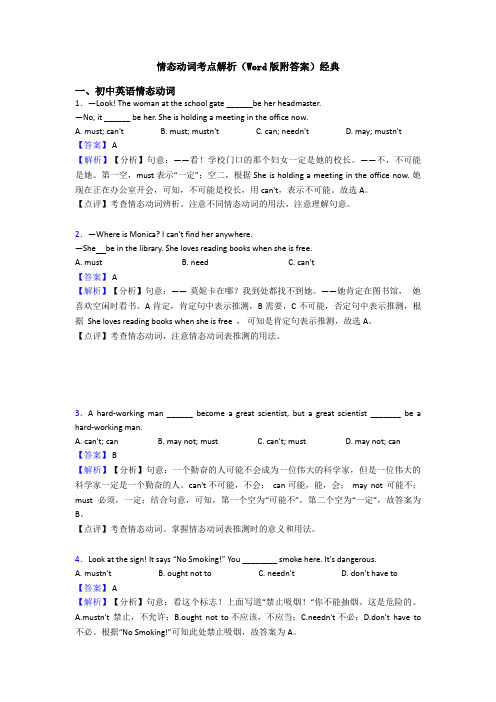
情态动词考点解析(Word版附答案)经典一、初中英语情态动词1.—Look! The woman at the school gate ______be her headmaster.—No, it ______ be her. She is holding a meeting in the office now.A. must; can'tB. must; mustn'tC. can; needn'tD. may; mustn't【答案】 A【解析】【分析】句意:——看!学校门口的那个妇女一定是她的校长。
——不,不可能是她。
第一空,must表示“一定”;空二,根据She is holding a meeting in the office now. 她现在正在办公室开会,可知,不可能是校长,用can't,表示不可能。
故选A。
【点评】考查情态动词辨析。
注意不同情态动词的用法,注意理解句意。
2.—Where is Monica? I can't find her anywhere.—She be in the library. She loves reading books when she is free.A. mustB. needC. can't【答案】 A【解析】【分析】句意:——莫妮卡在哪?我到处都找不到她。
——她肯定在图书馆,她喜欢空闲时看书。
A肯定,肯定句中表示推测,B需要,C不可能,否定句中表示推测,根据 She loves reading books when she is free ,可知是肯定句表示推测,故选A。
【点评】考查情态动词,注意情态动词表推测的用法。
3.A hard-working man ______ become a great scientist, but a great scientist _______ be a hard-working man.A. can't; canB. may not; mustC. can't; mustD. may not; can【答案】 B【解析】【分析】句意:一个勤奋的人可能不会成为一位伟大的科学家,但是一位伟大的科学家一定是一个勤奋的人。
中的情态动词与推测推理的语义辨析

中的情态动词与推测推理的语义辨析情态动词是英语中一类特殊的助动词,用于表达说话人对某个动作、情况或状态的态度、看法、判断以及可能性等。
推测推理则是通过已有信息对未知情况进行推断。
本文将对中的情态动词与推测推理进行语义辨析。
一、情态动词1. can情态动词"can"用于表示能力、许可和可能性等。
它表示目前或持续的能力、技能或许可。
例如:"I can swim"(我会游泳)、"Can Iborrow your pen?"(我可以借用你的笔吗?)、"He can be here by 6 pm."(他可能在6点前到达这里)。
2. could情态动词"could"常用于表示过去的能力、请求和推测等。
它表示过去或过去某个时间点的能力、技能、请求或许可。
例如:"When I was young, I could run very fast."(当我年轻的时候,我跑得很快)、"Could you please pass me the salt?"(你能给我递一下盐吗?)、"I couldn't guess the answer."(我猜不到答案)。
3. may情态动词"may"用于表示许可、可能性和推测等。
它表示说话人对某件事有一定的可能性,或询问对方是否同意某事。
例如:"May I use your computer?"(我可以用你的电脑吗?)、"It may rain tomorrow."(明天可能会下雨)、"He may have missed the bus."(他可能错过了公交车)。
4. might情态动词"might"通常用于表示较弱的可能性、委婉的请求和推测等。
情态动词:可能性与必然性的微妙区分

情态动词:可能性与必然性的微妙区分
情态动词用于表达可能性时,可以通过语境、语调和具体的词汇搭配来区分可能性与必然性。
以下是一些具体的区分方法:
1.语境分析:情态动词的使用往往依赖于语境。
在某些情况下,即使使用了
表示可能性的情态动词,也可能隐含着一种必然性的含义。
因此,理解整个句子的语境是非常重要的。
2.语调的差异:不同的语调可以改变情态动词的含义。
例如,当使用“can”
表示可能性时,通常采用较为中性的语调;而当表示必然性时,通常采用更加肯定和强硬的语调。
类似地,其他情态动词也可以通过语调来区分可能性与必然性。
3.与具体词汇的搭配:情态动词与其他词汇的搭配也可以影响其含义。
例如,
“He can win the race”这句话中,“can”表示一种理论上的可能性,但与“easily”等词搭配使用时,则可能隐含一种必然性的含义。
4.上下文线索:在某些情况下,上下文中的线索可以帮助区分可能性与必然
性。
例如,“He can solve the problem”这句话,如果上下文中没有其他线索表明这是一个必然的结果,那么通常被解释为表示可能性。
综上所述,情态动词用于表达可能性时,区分可能性与必然性需要综合考虑语境、语调、词汇搭配和上下文线索等多个因素。
正确理解这些因素可以帮助我们更准确地表达自己的意图和态度,避免产生歧义或误解。
情态动词辨析 (近6年武汉中考及调考原题)

近几年武汉中考调考情态动词原题1. —I don’t care what people think.— Well, you _____. Some opinions are worth weighing. (20年武汉中考)A.MightB. shouldC. couldD. would2. —Cross the road very carefully. Look both ways, or you be knocked down. —Got it. (2020五调)3. -Do have to finish my homework tonight, mom?- Yes, You (20元调)A.willB. shouldC.mustD.may4 —Try this soup—you______like it,—Wow!This is delicious! (19年武汉中考)A.mustB.willC.shallD.can5.-My parents _allow me to go swimming in the river without them.(2019.四)-I think so. That’s too dangerous.A. shouldn’tB. wouldn’tC. mustn’tD. needn’t6 .Sir, you _be sitting in the waiting room. It is for women and children only.(2019.元)A. shouldn’tB. can’tC. won’tD. needn’t7.-Must you go?(2018,中)-Yes, I’m afraid I really _.A. mayB. shouldC. mustD. can8.-I thought you _like something to read, so I have brought you some books.-Thanks a lot.(2018, 四)A. mayB. mightC. couldD. must9.-I heard the fire spread very quickly through the hotel, but everyone _get out.-I can’t believe it!(2018,元)A.had to B. could C. was able to D. would10 .-Have you got the results of the exam?-No. All we _do now is to wait.(2017, 中)A. mustB. canC. mayD. could11.-Could I call you by the first name?-Yes, you _(2017,四)A. willB. couldC. mayD. might12.-When can I come for the photos? I need them tomorrow.-They _be ready by 12:00.(2017,元)A.can B. should C. might D. need13.-I still haven’t found my pet dog.-I’m sorry to hear that .You _be very sad. (2016,中)A. canB. shouldC. mustD. will14.-Is Wilson on duty in class today?-It _be him. It’s his turn tomorrow.(2016, 四)A. mustB. can’tC. shouldD. needn’t15.-Have you decided which senior high school to choose?-Not yet. I _go to the Sunshine School. (2016,元)A. shouldB. needC. mayD. must16.If you wish, you _come in and have a cup of coffee. (2015,中)A.mayB. mustC. wouldD. should17.It is usually quite warm in my hometown in March, but it _be rather cold sometimes. (2015,四)A. mustB. canC. shouldD. need18.-Can I leave my car outside at night?-You _better not. (2015,元)A.shouldB. wouldC. couldD. had情态动词辨析1-4BACB 5-8 BACA 9-12C BCBC 13-18 BCABD。
情态动词详解+例句

情态动词详解+例句一、单项选择情态动词1. ---Is Jack on duty today?---It ________ be him. It's his turn tomorrow.A.mustn't B.won't C.can't D.needn't【答案】C【解析】【详解】考查情态动词表示推测。
句意:--今天杰克值日吗?--不可能是他。
明天该轮到他。
can’t be 用于否定推测“不可能是”,must表示推测的时候,表示“肯定是”,won’t不愿意,needn’t 不必,故选C。
2.—I have something important to tell John. But I can’t find him.—His cell phone is here, so he ________ have gone too far.A.mustn’t B.needn’tC.wouldn’t D.can’t【答案】D【解析】【详解】考查情态动词。
句意:——我有重要的事情要告诉John,但是我找不到他。
——他的手机在这儿,所以他不可能走得太远。
根据句意可知,此处是对过去的一种猜测,此处是表达不可能……,用can’t have done。
故选D。
3.The accident which left 15 people on board dead ________ if both the angry female passenger and the bus driver had kept calm.A.should have avoided B.should be avoidedC.could have avoided D.could have been avoided【答案】D【解析】【详解】考查“情态动词+完成式”。
句意:如果愤怒的女乘客和巴士司机保持冷静,这起导致15人死亡的事故本来是可以避免的。
- 1、下载文档前请自行甄别文档内容的完整性,平台不提供额外的编辑、内容补充、找答案等附加服务。
- 2、"仅部分预览"的文档,不可在线预览部分如存在完整性等问题,可反馈申请退款(可完整预览的文档不适用该条件!)。
- 3、如文档侵犯您的权益,请联系客服反馈,我们会尽快为您处理(人工客服工作时间:9:00-18:30)。
情态动词辨析专项训练
1.-My parents _allow me to go swimming in the river without them.(2019.四)
-I think so. That’s too dangerous.
A. shouldn’t
B. wouldn’t
C. mustn’t
D. needn’t
2.Sir, you _be sitting in the waiting room. It is for women and children only.(2019.元)
A. shouldn’t
B. can’t
C. won’t
D. needn’t
3.-Must you go?(2018,中)
-Yes, I’m afraid I really _.
A. may
B. should
C. must
D. can
4.-I thought you _like something to read, so I have brought you some books.
-Thanks a lot.(2018, 四)
A. may
B. might
C. could
D. must
5.-I heard the fire spread very quickly through the hotel, but everyone _get out.
-I can’t believe it!(2018,元)
A.had to B. could C. was able to D. would
6.-Have you got the results of the exam?
-No. All we _do now is to wait.(2017, 中)
A. must
B. can
C. may
D. could
7.-Could I call you by the first name?
-Yes, you _(2017,四)
A. will
B. could
C. may
D. might
8.-When can I come for the photos? I need them tomorrow.
-They _be ready by 12:00.(2017,元)
A.can B. should C. might D. need
9.-I still haven’t found my pet dog.
-I’m sorry to hear that .You _be very sad. (2016,中)
A. can
B. should
C. must
D. will
10.-Is Wilson on duty in class today?
-It _be him. It’s his turn tomorrow.(2016, 四)
A. must
B. can’t
C. should
D. needn’t
11.-Have you decided which senior high school to choose?
-Not yet. I _go to the Sunshine School. (2016,元)
A. should
B. need
C. may
D. must
12.If you wish, you _come in and have a cup of coffee. (2015,中)
A.may
B. must
C. would
D. should
13.It is usually quite warm in my hometown in March, but it _be rather cold sometimes. (2015, 四)
A. must
B. can
C. should
D. need
14.-Can I leave my car outside at night?
-You _better not. (2015,元)
A. should
B. would
C. could
D. had。
